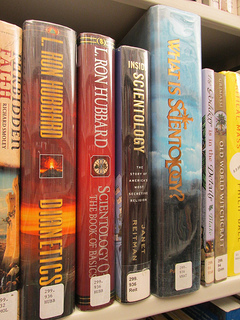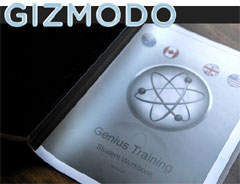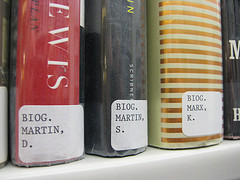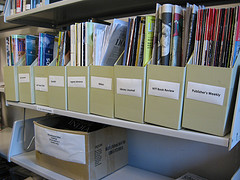January 16th, 2013 Brian Herzog
 A couple weeks ago, my library received the latest shipment of free Scientology books, and I'm guessing your library did too. On the whole, we never want these books, and rarely do they make it to our shelves (or even out of the boxes they came in).
A couple weeks ago, my library received the latest shipment of free Scientology books, and I'm guessing your library did too. On the whole, we never want these books, and rarely do they make it to our shelves (or even out of the boxes they came in).
So I was happy to see a post on the Maine Libraries listserv the following week (from Mamie Anthoine Ney of the Southern Maine Library District) detailing an email exchange she had with the company that sends them out. She asked them to stop sending them to her site, and this is the response she received:
Dear Ms Ney,
Thank you for message alerting me to this situation.
I have taken your address off the mailing list.
If you have not been able to send the books back yet, let me know the correct address, contact name and number and I can have my shipping department get FedEx to pick them up.
The books are very valuable and I do not want them to go to waste.
I will pick these up right away if you have not been able to arrange this.
Best regards,
Mr. Larry Perras
Library Distribution Manager
Bridge Publications
5600 E. Olympic Blvd.
Los Angeles, California 90022
(323) 888-6200
Mr. Perras' email is address is [email protected] and he is the person to contact if you'd like your library to stop getting these boxes of books. I forwarded this to my library's Head of Technical Services, and she was only too happy to email them to take us off the list (although we never got a reply from them).
Thank you Mamie for sharing this information - hopefully it will keep more of these books from ending up in dumpsters.
Posted under Uncategorized | 14 Comments »
August 29th, 2012 Brian Herzog
A couple of totally unrelated really good ideas (I think), before I head to Ohio for a long Labor Day weekend:
Good Idea #1
First, for all you DVD collection development librarians out there, here is a must-add for the library's collection:
A 50-DVD set of The Red Green Show! 300 episodes = ~124 hours of wisdom from Possum Lodge, plus bonus material. Of course, the $299.99 price tag made my colleague who does our DVD selection just say "no."
Good Idea #2
 Second, an Apple Store training manual for their Genius Bar employees was reviewed at Gizmodo. From the tl;dr write up on BoingBoing, some great training gems caught my eye:
Second, an Apple Store training manual for their Genius Bar employees was reviewed at Gizmodo. From the tl;dr write up on BoingBoing, some great training gems caught my eye:
What does a Genius do? Educates. How? "Gracefully." He also "Takes Ownership" "Empathetically," "Recommends" "Persuasively," and "Gets to 'Yes'" "Respectfully."
From the comments, it appears the existence of this manual met with a large degree of cynicism. However, swap out "Genius" for "Librarian" and this exactly sums up what our desk staff should aspire to.
Taking ownership of a problem can be difficult in a public library, because not everything is something library staff can help with. But when it is within our power - especially concerning a library resource or service - taking ownership is the best way solve a patron's problem. Because if one of our patrons can't use a library resource, then it's a library problem.
And initially I was uncomfortable with the word "persuasively," because it sounds very retail. But after I thought about it, I often actively try to persuade patrons all the time, in the sense of recommending - and leading them to - what I think is the best resource. "Yes, maybe this recently-published book on skin cancer is a better choice, even though that one from 1995 is thinner and has more pictures. Of course, you can always take both." Or, "Instead of trying to figure out how to cite Yahoo Answers in your term paper, how about I show you how to use our journal databases?" Of course librarians persuade - empathetically and respectfully - but don't force or withhold information. We certainly try to recommend the best resources possible, but it's always up to the patron to make their own decisions.
Not that I should be surprised Apple has good customer service ideas - I've certainly drawn inspiration from them before.
I hope everyone has a good long weekend - see you next week.
Tags: apple, apple store, collection development, customer service, dvd, genius bar, good ideas, libraries, Library, public, Random, red green, Service, the red green show, training
Posted under Uncategorized | 1 Comment »
March 28th, 2012 Brian Herzog
I'm still unpacking from PLA12 two weeks ago, and just came across notes I took during a great session on Weeding in the Digital Age. I know it's two weeks late, but it's still relevant. The discussion was led by Alene Moroni (Manager, Selection and Order, King County Library System), Stephanie Chase (Reference, Adult Services, and Programming Coordinator, Multnomah County Library), and Kaite Stover (Kansas City Public Library, Kansas City Public Library).
Program Description:
The explosion in formats for leisure materials is a challenge for all aspects of collection management, especially weeding and evaluation. Join a discussion that asks librarians to consider format, space, use, and building design when evaluating materials in all formats for withdrawal from the collection.
We should hold digital collections to the same standards as print collections - this means weeding out the unused and out-of-date to avoid eclutter.
Tips for Weeding Digital Collections
- Do you weed your Overdrive catalog? It's not easy (you need to do the legwork yourself, and email Overdrive directly), but their interface is difficult enough to search so that if something isn't getting used, then it's getting in the way
- Look for overlap in research databases, and then cut the unnecessary ones
- Your access and finding tools can go a long way to cutting through the clutter - look for better catalog/database search interfaces, or create web-based pathfinders with direct links into databases
Thoughts on Formats
- Watch for genre+format preferences that emerge (and listen to what patrons tell you). For instance, perhaps your mystery print books don't circulate much, because mystery reader prefer digital - but perhaps just the opposite is true for westerns. If that's the case, then get rid of your westerns ebooks and focus on mysteries
- Large print physical books are not dying, even though ereaders can do large print
- Younger patrons are often format-agnostic: if they can get their book in print, ebook, book on CD, downloadable audiobook, etc, they're happy
But remember: just about anything you're getting in digital format now can be taken away with a mere licensing change - what then?
I liked this session a lot because it hadn't occurred to me to weed ebooks. I have done some of that with databases, but certainly not Overdrive. It's also good to hear how other libraries balance print and online purchasing - for instance, we subscribe to the Safari Computer Ebooks database, and so have cut back on our print computer books.
Tags: Books, collection development, collections, Conferences, digital, libraries, Library, pla, pla12, public, wedding, weed
Posted under Uncategorized | 3 Comments »
April 22nd, 2010 Brian Herzog
 My library's ever-shrinking book budget has made me be more discerning when it comes to selection. However, one area that is always difficult for me is biographies.
My library's ever-shrinking book budget has made me be more discerning when it comes to selection. However, one area that is always difficult for me is biographies.
It seems like every troubled athlete, aging celebrity, recovering musician, reality television personality, unfaithful politician (and their wives), have all signed book deals. I don't pay much attention to pop culture personalities, so it's hard for me to tell if the person is someone significant.
So I was joking with a coworker about a new selection criteria for all of these celebrity memoirs. Since the importance of many of these people is based on social zeitgeist, I thought I could use Google to help me decide. I figure that if a person is important, a Google search for that person's name should return at least one million webpages. If they're above that (arbitrary) threshold, I'll buy their biography - if not, then I'll check again when the paperback comes out.
Granted, not all my ideas are practical, but here's how some current biographies fare with this "hive mind" selection criteria:
- The Bridge: The Life and Rise of Barack Obama, by David Remnick (51,900,000 for "Barack Obama")
- Oprah: A Biography, by Kitty Kelley (21,900,000 for "Oprah")
- Hellhound on His Trail: The Stalking of Martin Luther King, Jr. and the International Hunt for His Assassin, by Hampton Sides (12,300,000 for "Martin Luther King")
- Bowie: A Biography, by Marc Spitz (10,400,000 for "David Bowie")
- Are You There, Vodka? It's Me, Chelsea, by Chelsea Handler (3,450,000 for "Chelsea Handler")
- The Bedwetter: Stories of Courage, Redemption, and Pee, by Sarah Silverman (2,810,000 for "Sarah Silverman")
- Staying True, by Jenny Sanford (2,280,000 for "Jenny Sanford")
- A Funny Thing Happened on the Way to the Future: Twists and Turns and Lessons Learned, by Michael J. Fox (1,430,000 for "Michael J. Fox")
- Raquel: Beyond the Cleavage, by Raquel Welch (1,250,000 for "Raquel Welch")
- This Time Together: Laughter and Reflection, by Carol Burnett (868,000 for "Carol Burnett")
- A Game of Character: A Family Journey from Chicago's Southside to the Ivy League and Beyond by Craig Robinson (504,000 for "Craig Robinson")
- When I Stop Talking, You'll Know I'm Dead: Useful Stories from a Persuasive Man by Jerry Weintraub and Rich Cohen, (373,000 for "Jerry Weintraub")
- I Am Nujood, Age 10 and Divorced, by Nujood Ali (268,000 for "Nujood Ali")
- The Publisher: Henry Luce and His American Century, by Alan Brinkley (193,000 for "Henry Luce")
- Killing Willis: From Diff'rent Strokes to the Mean Streets to the Life I Always Wanted, by Todd Bridges and Sarah Tomlinson (141,000 for "Todd Bridges")
- Fighter Pilot: The Memoirs of Legendary Ace Robin Olds, by Robin Olds, Christina Olds, and Ed Rasimus (122,000 for "Robin Olds")
Obviously, not flawless, but this Google criteria might help tell me who I should pay attention to. And in addition to traditional reviews and ratings, another one of my tactics is to wait until requests for a book reach a certain number before ordering it, but that method only addresses demand after the fact, and leaves out the patrons who didn't think to request it.
Selection is a fine art, but when it comes to biographies, most my crayons are dull.
Tags: biographies, biography, Books, collection development, google, libraries, Library, memoir, memoirs, popular, popularity, public, selection, zeitgeist
Posted under Uncategorized | 8 Comments »
March 12th, 2009 Brian Herzog
 I have always struggled with doing selection, but it only recently occurred to me that technology could make the process easier.
I have always struggled with doing selection, but it only recently occurred to me that technology could make the process easier.
My normal procedure for selection was to pick one Friday a month and go through whatever review journals I could find in the library that I hadn't already looked at and read reviews. This rarely happened each month as planned, and I'd slip further and further behind - making catching up that much more daunting.
I decided my relying on journals was the problem - it wasn't something I routinely did, so it was easy to forget or ignore. But, I do check rss feeds in my Bloglines account almost every day, so I thought if I could get reviews delivered to me (into a "Selection" folder), selection could become something I did for a few minutes each day, instead of an entire afternoon once a month.
So far, I've found a few good sources for rss feeds, and am always on the lookout for more:
- Feeds from BookLetters
My library subscribes to BookLetters to offer our patrons readers advisory resources through our website. Most of their various reading lists are available as rss, so that's perfect. I added the Books on the Air, Book Sizzle (ie, "hot" books), Nonfiction Preview and Nonfiction Best Sellers feeds, although they have plenty more to choose from
- Feeds from Amazon.com
Amazon also offers both best seller and new release lists as rss feeds. Each grouping is also broken down by subject, so I can grab the feeds for just the nonfiction subjects I do selection for - for instance, Travel best sellers and Travel new releases
- Feeds from Library Journal
Library Journal offers a ton of different feeds, but I'm still experimenting to see which is the most useful. Most include subjects I'm not interested in, or news and articles beyond just book reviews, so I'm going to keep refining how I use their feeds. However, as opposed to being a "new" source like BookLetters and Amazon, this is just getting in a new format the same information I've been using for years
Of course, I'm not abdicating my responsibilities as a professional librarian just because I'm getting information from sources other than print journals and vendor catalogs. I still read the reviews, check local holdings, and make educated decisions about the books on these various lists, just like I would if I learned about a book from a print journal.
As I see it, here are the pros of this method:
- It fits better into the way I work, which means it gets done better and faster than something that doesn't (which means my patrons get better service because I'll mark books to order on a daily basis instead of a monthly [or worse] basis)
- My library is very much a popular materials library, and these are reliable sources for what's popular right now
- When reviewing books on Amazon, a greasemonkey script linking right from the Amazon page to our catalog makes seeing if we already own it very easy (another greasemonkey script lets me add it to our ordering queue with just a single click, too)
- If a title is showing up on multiple lists, it's a pretty good indicator of how many copies my patrons will demand
However, there are also things to watch for:
- Amazon often pushes things, like Kindle editions, that I'm not interested in
- Re-releases and paperback editions will also show up on these feeds, and since the greasemonkey script does an ISBN search, double-checking with a title search to make sure we don't already own a copy is important
- Many new books don't have online reviews (even using my online book reviews search)
I've only been using this method for a couple months, but already I feel like I'm ordering more books, and more quickly. Anything that makes selection easier is a step in the right direction - and it's certainly easier than trekking all over the building to find out who had Library Journal last.
Tags: book, Books, buying, coll dev, collection development, feed, feeds, libraries, Library, material, materials, public, reviews, rss, selecting, selection, Technology
Posted under Uncategorized | 9 Comments »
November 18th, 2008 Brian Herzog
 Personnel changes at my library are changing the way we do collection development. So for the past couple weeks, I've been thinking about how to incorporate more review-reading and book selection into my workday.
Personnel changes at my library are changing the way we do collection development. So for the past couple weeks, I've been thinking about how to incorporate more review-reading and book selection into my workday.
Since this has been on my mind, I had two slightly unusual ideas for potential ways to supplement more traditional selection.
Selection via LibraryThing Early Reviewers
I've been a part of the LibraryThing.com Early Reviewers program since it started (if you haven't, and enjoy reading, it's worth checking out). I've used this as a resource for new books for awhile, but something I noticed recently was that the books I like often had the most requests.
My idea was for Tim to whip together one of his useful tools, so that librarians (or anyone who signed up) could receive an email (or rss feed) each month after the list has closed, with the title of each book, how many requests it got, and also a link to LibraryThing or Amazon. My logic was that if a book appears popular with LibraryThing'ers, there's a good chance it will also be popular in my library.
I wrote to Tim and asked him about this just a couple days ago, and I'm hoping for a positive response. But if you like the idea, contact LibraryThing and ask them to implement it. Lobbying like this is probably the last thing he wants, but I do think this could be a valuable and unique selection tool.
Selection via Universal Medical Database
For awhile now there's been talk about the government and hospitals trying to start a single database of health information of every American.
The pros are that it'd be easier for a doctor anywhere in the country to access someone's medical history in an emergency, and it could also prevent conflicting medications and stop people shopping around for prescription narcotics. Drawbacks of the idea are that it potentially leaves people open to an invasion of privacy, or allows employers and others to discriminate based on medical conditions.
What does this have to do with libraries? It occurred to me that if such a universal system ever were put in place, it could potentially be used to help improve a library's collection of medical books. If real-time statistics could be provided on what conditions and illnesses were prevalent in a particular community, the library could use that information to make sure it had books and information on those topics.
Not that either of these might ever come to pass, and they both have a very big-brothery feel to them. These ideas are just some idle speculation on alternative selection tools to supplement traditional methods.
Posted under Uncategorized | 2 Comments »
 A couple weeks ago, my library received the latest shipment of free Scientology books, and I'm guessing your library did too. On the whole, we never want these books, and rarely do they make it to our shelves (or even out of the boxes they came in).
A couple weeks ago, my library received the latest shipment of free Scientology books, and I'm guessing your library did too. On the whole, we never want these books, and rarely do they make it to our shelves (or even out of the boxes they came in).




